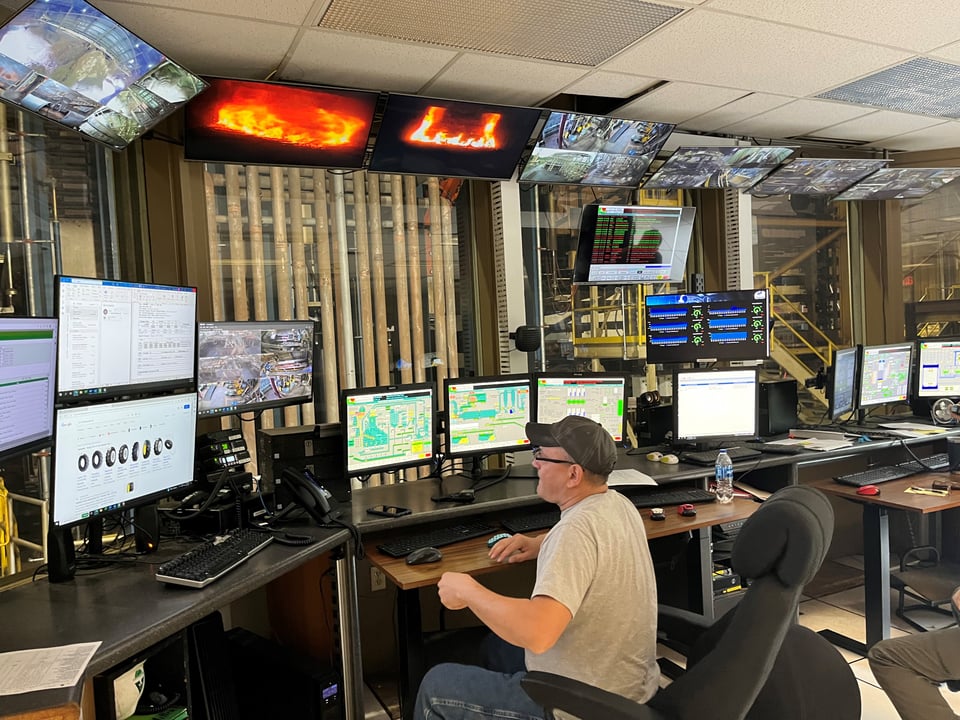How Weyerhaeuser is using AI to streamline operations
In a recent blog post, Weyerhaeuser (WY) shared a fascinating behind-the-scenes peek at how the company is leveraging AI tech to optimize operations and streamline workflow. At its Sutton OSB plant in Heaters, West Virginia, the company says 200,000 pounds of wood strands are dried in four sets of triple-pass dryers every hour. Those dry strands are then blended with resin and formed into 12-foot-by-24-foot mats, which are then cured in the hot press and cut into 4-foot-by-8-foot boards of OSB.
According to WY, equipment operators working on the dryers monitor variables that can affect the final product, including humidity and temperature (which if off-kilter can leave the product too moist). Operators make adjustments to the dryer temperature settings accordingly. WY shares that experienced operators are well-trained to spot defects in the panels and adjust quickly — though it can take up to 120 minutes for those adjustments to take effect in the manufacturing line. Also, operators can’t instantly analyze large quantities of data available from the dryers or constantly predict how different variables will interact.
“That’s where artificial intelligence comes in,” says James Liston, a technical support engineer with WY. “Our new AI system analyzes thousands of data points and automatically changes the dryer settings in response. It’s kind of like adaptive cruise control on a car.”
The custom AI machine learning system, designed by AI2Infinity, aims to complement the operators' work rather than replace the human touch. The tech uses sensors in the machines to measure variables such as temperature and humidity, then produces a model that constantly monitors the process and can adjust equipment settings in response to changing variables.
WY says the program was installed and tested by a large cross-disciplinary team including mill employees, IT specialists and regional leaders.
WY says its companywide "Emerging Technology Council" has helped manage the project to "provide a streamlined way of identifying and overcoming hurdles involving networking, software and more."
The team debuted the new system in spring 2022 and worked with the site's operators to evaluate the model produced by the AI and decide how to best use it.
“They were skeptical at first, but after seeing it in action, they’ve come to embrace this technology,” says Bruce Honda, wood products engineering technical specialist.
Humans and machines working together
After testing the model’s performance, in April 2023 the team turned on the AI2Infinity program within the existing process control systems, which WY says is akin to putting the dryers in adaptive cruise control mode. It now optimizes dryer outlet temperature control on all four dryers, consistently maintaining desired surface and core moisture levels.
“Talking to subject matter experts like the equipment operators and Bruce allowed us to develop this project at a rapid pace,” says Craig Ennis, founder of AI2Infinity. “It’s really a hand-in-glove approach: humans and machines working together to create the best outcomes. The AI program is able to point out patterns nobody was aware of.”
WY says operators are empowered to choose whether or not to employ the system while on the job, which they currently do about 80 percent of the time.
“Ai2Infinity shows promise, especially when training newer operators,” says Ted Pendry, WY's control room operator. “Using it allows me to focus on other things while we’re running. You have to have patience as we work though all the different things that can happen."
The system "inactivates" itself if anything goes wrong, and employees who work with the dryers can choose to turn it off at any time, WY reports.
Replicating tech success
WY says the "architecture" of Sutton’s program is now being replicated at its engineered wood products plant in Eugene, Oregon, to help streamline veneer press operations.
“This technology is self-learning, so it will just get better and better over time,” Liston says. “Thanks to all the historical data we’ve fed it, the AI is faster at determining when to modify the settings than humans are. I think it has tremendous potential to drive safer and more reliable operations at every facility, in some way or another. This has truly been a remarkable group effort driven by ambition, curiosity and passion. It’s exciting to be at the forefront of new technology that could transform the way our company runs.”
Read more about Weyerhaeuser's cutting-edge tech here.



